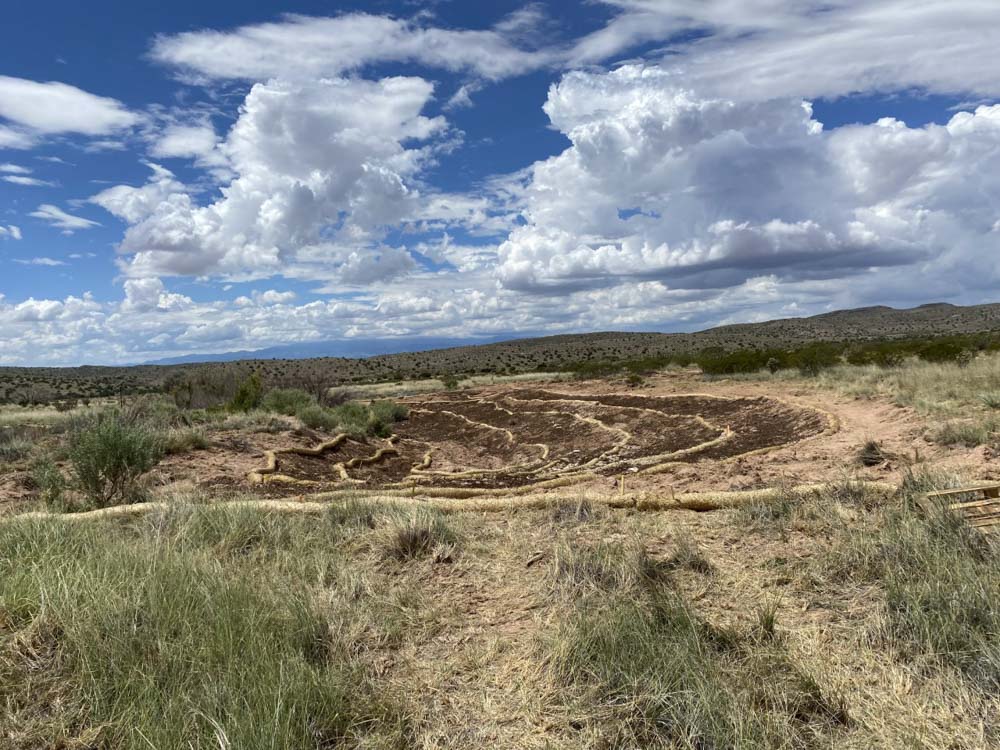Below is a blog post from the Bureau of Land Management.
On July 16, 2022, the Bureau of Land Management (BLM) New Mexico Socorro Field Office (SFO) teamed up with volunteers from the New Mexico Wild Sheep Foundation (NMWSF), Rocky Mountain Elk Foundation (RMEF), and Bat Conservation International (BCI), as well as local volunteers, to complete the La Caja Wildlife Habitat Restoration Project amid record summer heat. The project area was located near Socorro, New Mexico and within the Chupadera Mountains Landscape Project Area in the BLM-managed The Box Recreation Area.
This project was a good example of coordination and collaboration between multiple partners and resources to restore habitat at the landscape level, while at the same time achieving the multiple-use and sustained yield mission of the BLM.
The final phases of the project work included wildflower seeding to restore pollinator habitat and the construction of rock and wire gabions for erosion control as well as rockheader dams to enhance natural pools.
The project was part of a larger restoration initiative within the East Magdalena landscape, which involved construction of the La Caja Wildlife Water Development, including a pipe and cable livestock exclosure fence; mine closures and installation of bat gates; placement of waddles; mulch, rock and wire gabions; as well as the decommissioning and rehabilitation of the access road.
While the SFO provided materials for the project, generous contributions from habitat sponsors including the NMWSF and the Water for Wildlife Foundation allowed the SFO to contract out the construction of a 1,000-square-foot catchment, two BOSS Tank storage and drinkers, and a 2 and 3/8” pipe fence with two strands of ½” cable around the La Caja Wildlife Water Development.
BCI made development recommendations for bat-friendly pools and mine gates. RMEF and local volunteers helped the BLM complete the arduous work of seeding pollinator-friendly forbs, applying the mulch, installing the waddles, and constructing the gabions and rockheader dams.
The new water development will service an approximately one to two square mile area for emphasis species such as desert bighorn sheep, mule deer, and quail. The project will also support a much larger service area for more mobile wildlife species such as elk, which have become more abundant within the area. In addition, the project will help with the movement of desert bighorn sheep south of US Highway 60. With the enhancement of habitat with the water development, the sheep will expand their use of the area in and around the water. This will promote use and expansion of suitable habitat in the Chupadera Mountains and farther south into the Devils backbone, which is located on the south end of the Desert Bighorn Sheep Management Area. Meanwhile, the pools also provide a water source and feeding area for a variety of pollinator species such as bats, bees, butterflies and moths and will also serve as a supplemental water source for other wildlife such as desert bighorn sheep, mule deer, and elk.
Thanks to the hard work of numerous nonprofits and volunteers not afraid to get their hands dirty, the La Caja Wildlife Habitat Restoration Project will provide an overall reliable and long-term water source for wildlife for years to come.
Go here to see additional photos.
(Photo credit: Bureau of Land Management)
